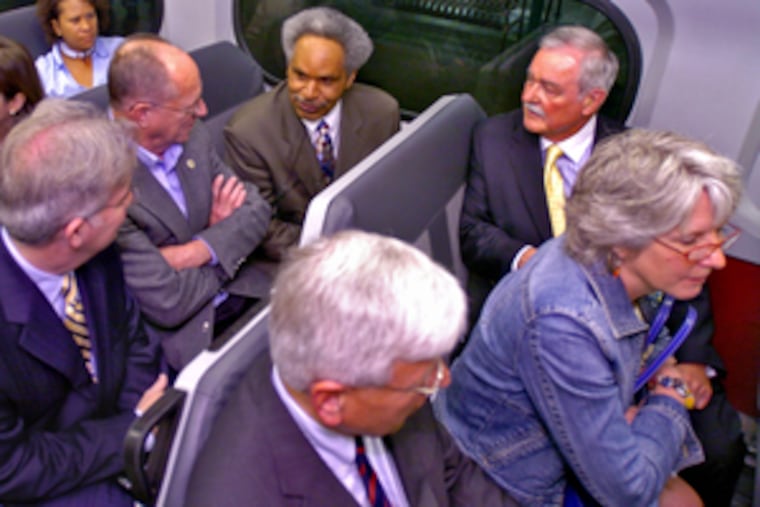Friends of SEPTA hop aboard a statewide effort to aid transit
Mayor Street and other political, business and labor leaders rallied yesterday for more state funding for public transportation, but they acknowledged they don't have a specific plan to support.

Mayor Street and other political, business and labor leaders rallied yesterday for more state funding for public transportation, but they acknowledged they don't have a specific plan to support.
Gathered before television lights in front of SEPTA ticket counters at Suburban Station, the local leaders warned of dire economic consequences if SEPTA enacts threatened fare hikes and service cuts due to lack of state funding.
"Without a resolution, this area is about to experience an economic heart attack," said Mark Schweiker, the former Republican governor who is now president of the Greater Philadelphia Chamber of Commerce. He said the region would lose half a billion dollars without SEPTA to provide transportation for workers, customers and clients.
Gov. Rendell, who attended a similar rally in Altoona yesterday, has suggested a tax on oil company profits to raise $760 million a year for transit agencies statewide. But he has not sent proposed legislation to lawmakers in Harrisburg.
With SEPTA's board scheduled to vote in two weeks on a budget for its new fiscal year, time is running out for help from Harrisburg. SEPTA faces a $130 million budget deficit for the fiscal year that begins July 1. If more state aid is not forthcoming, the transit agency says, it will raise fares by an average of 31 percent, cut service by 20 percent, and lay off 300 to 400 employees.
Rendell spokesman Barry Ciccocioppo said the administration would send proposed legislation to the General Assembly "hopefully soon."
"We're working with the legislators right now," Ciccocioppo said. "We're making good progress."
Legislative leaders have been cool to the oil-tax proposal, fearing that promised lawsuits by the oil companies would block revenues for years to come.
Rendell "is not concerned by those comments, because that's typical of the legislature at this stage," Ciccocioppo said. "The governor has said he's open to other proposals, but none has been forthcoming, as far as I know."
That left local officials yesterday as cheerleaders in search of a champion.
"If you asked those of us here, we might have 50 different solutions," Street said. " . . . I'll be supportive of any proposal that seems to make sense."
Pasquale "Pat" Deon, chairman of the SEPTA board, said legislative supporters of public transit had to make the necessary deals with rural legislators to get dedicated funding for transit agencies. "The excuses from Harrisburg have to stop," he said.
Suburban mayors, including Charles Wahl of Ambler, Jayne Young of Lansdowne, Tom Grady of Narberth, Robert McMahon of Media, and James Kennedy of South Coatesville, showed up to call for more dedicated funding for SEPTA.
Patrick Eiding, president of the Philadelphia Council of the AFL-CIO, and Hugh Long, regional chief of Wachovia Corp., were among the labor and business leaders on hand.
In Altoona, Rendell said ridership on the 73 transit systems in Pennsylvania had increased by more than four million in the last four years.
"State government in Harrisburg cannot walk away from public transportation issues," Rendell said. "If we do not deal with this issue, people will be left without the mobility they need to live and work. That outcome is simply unacceptable."